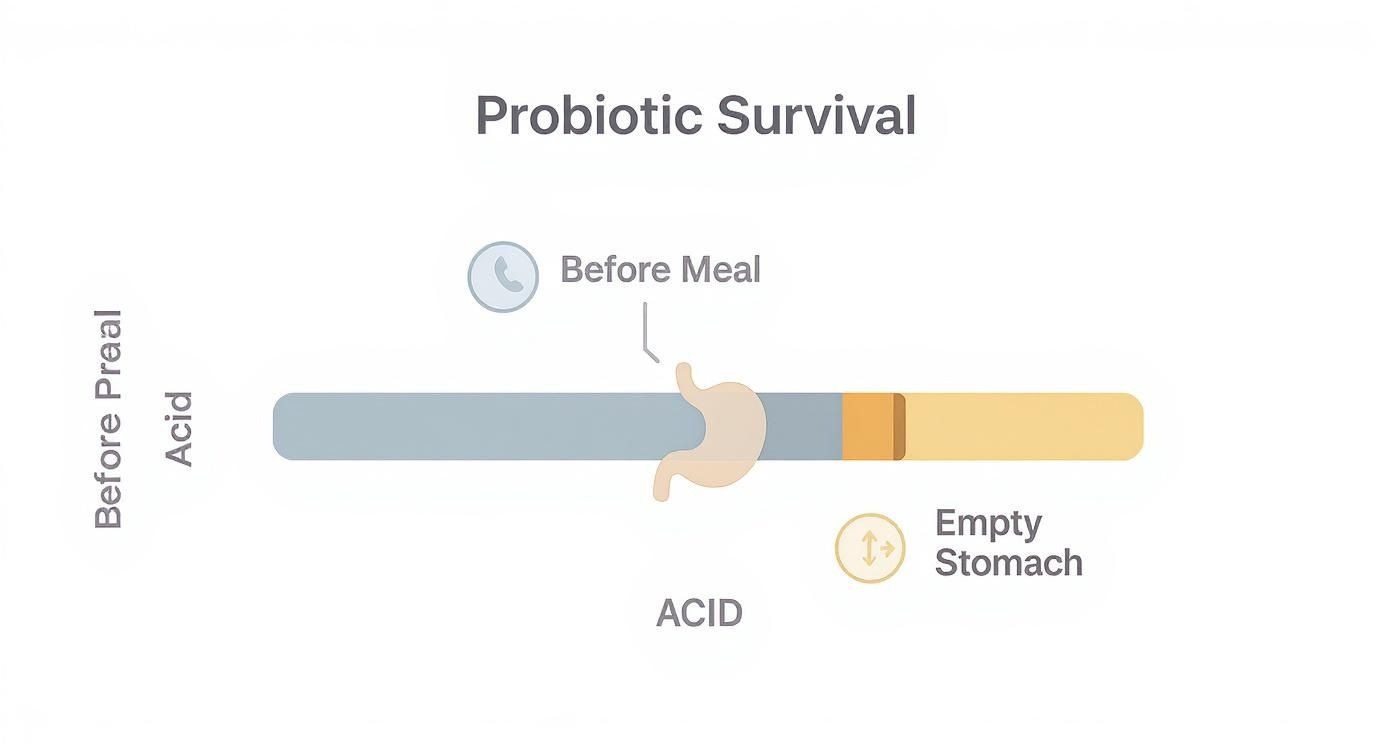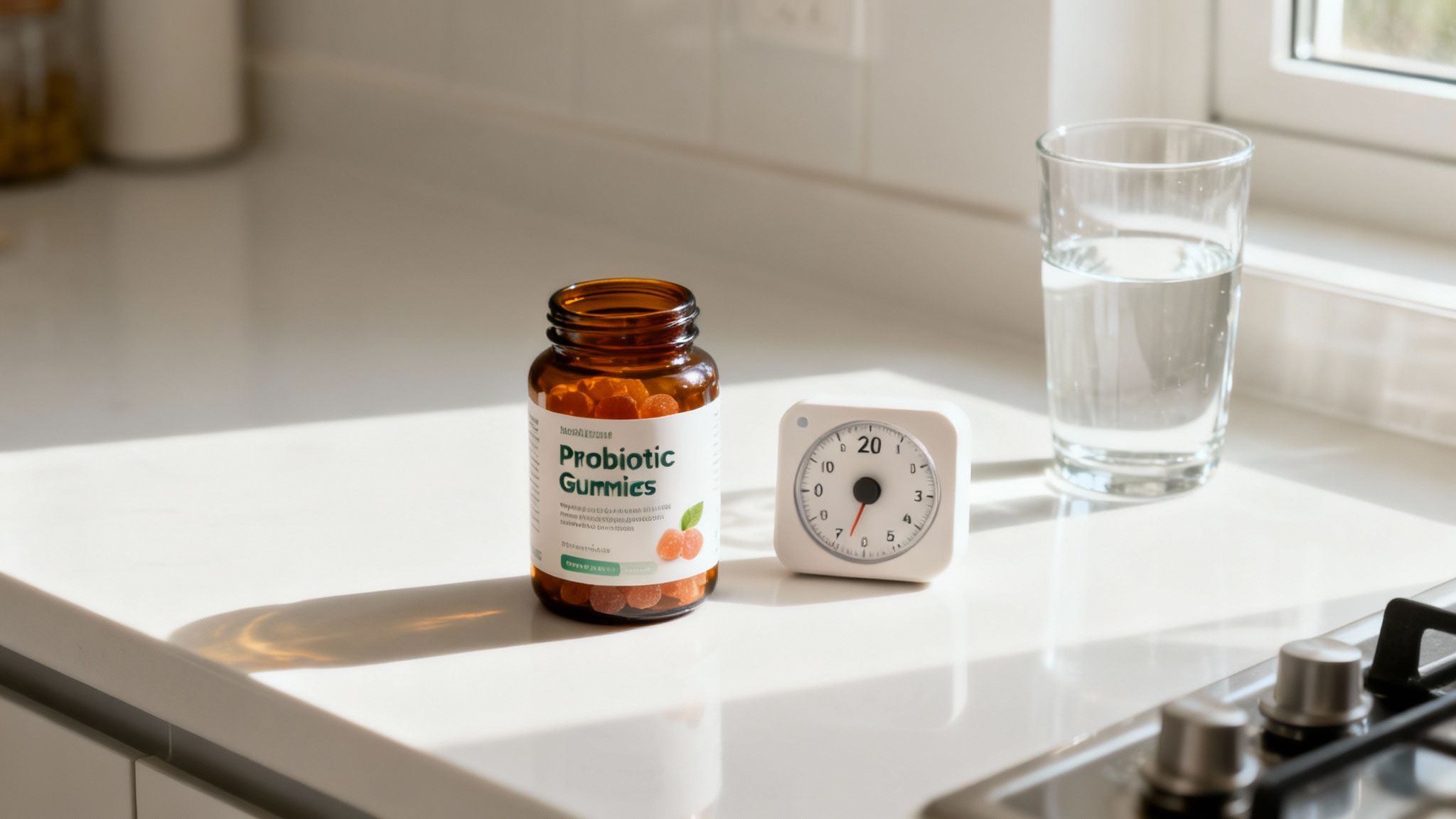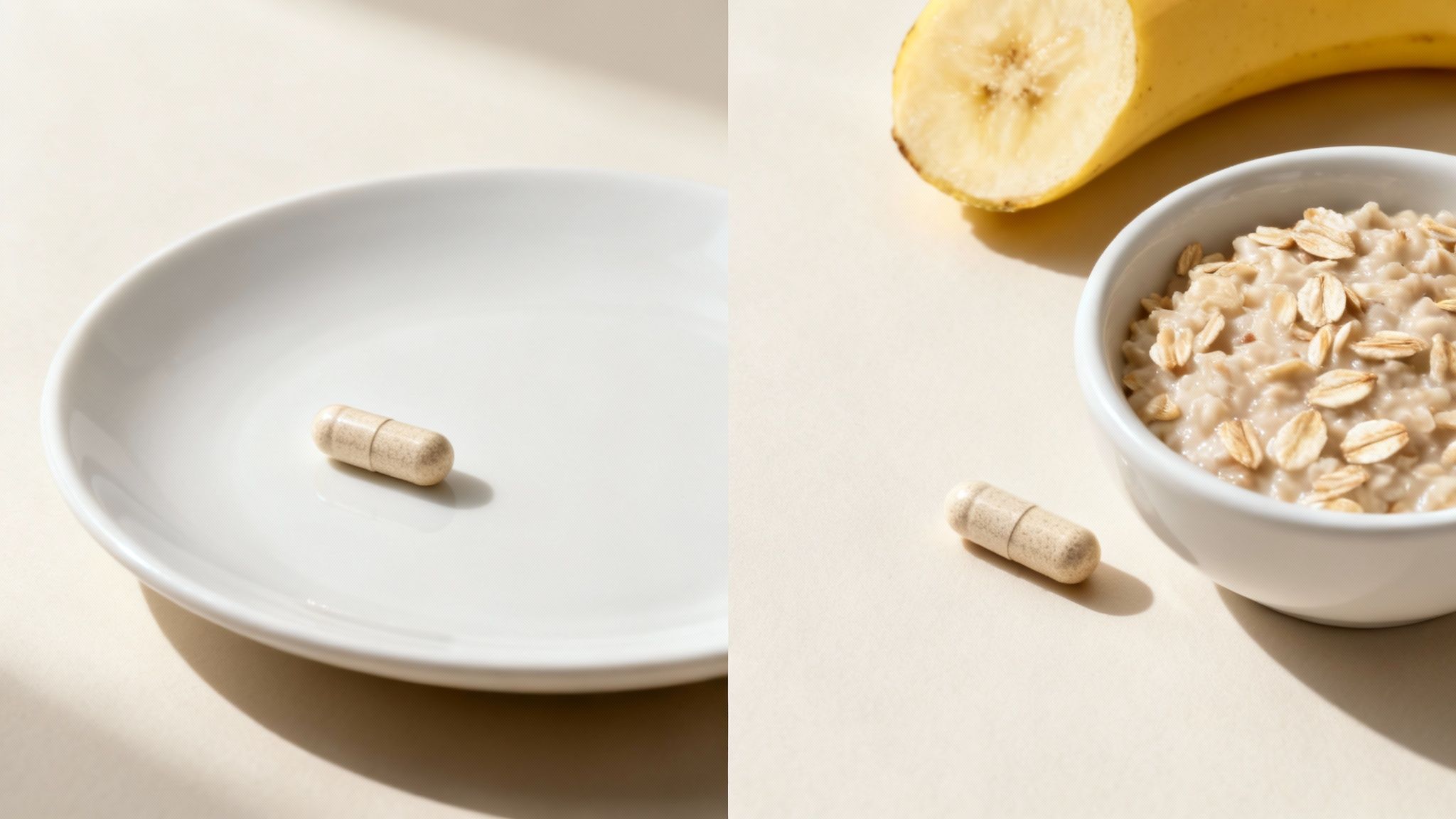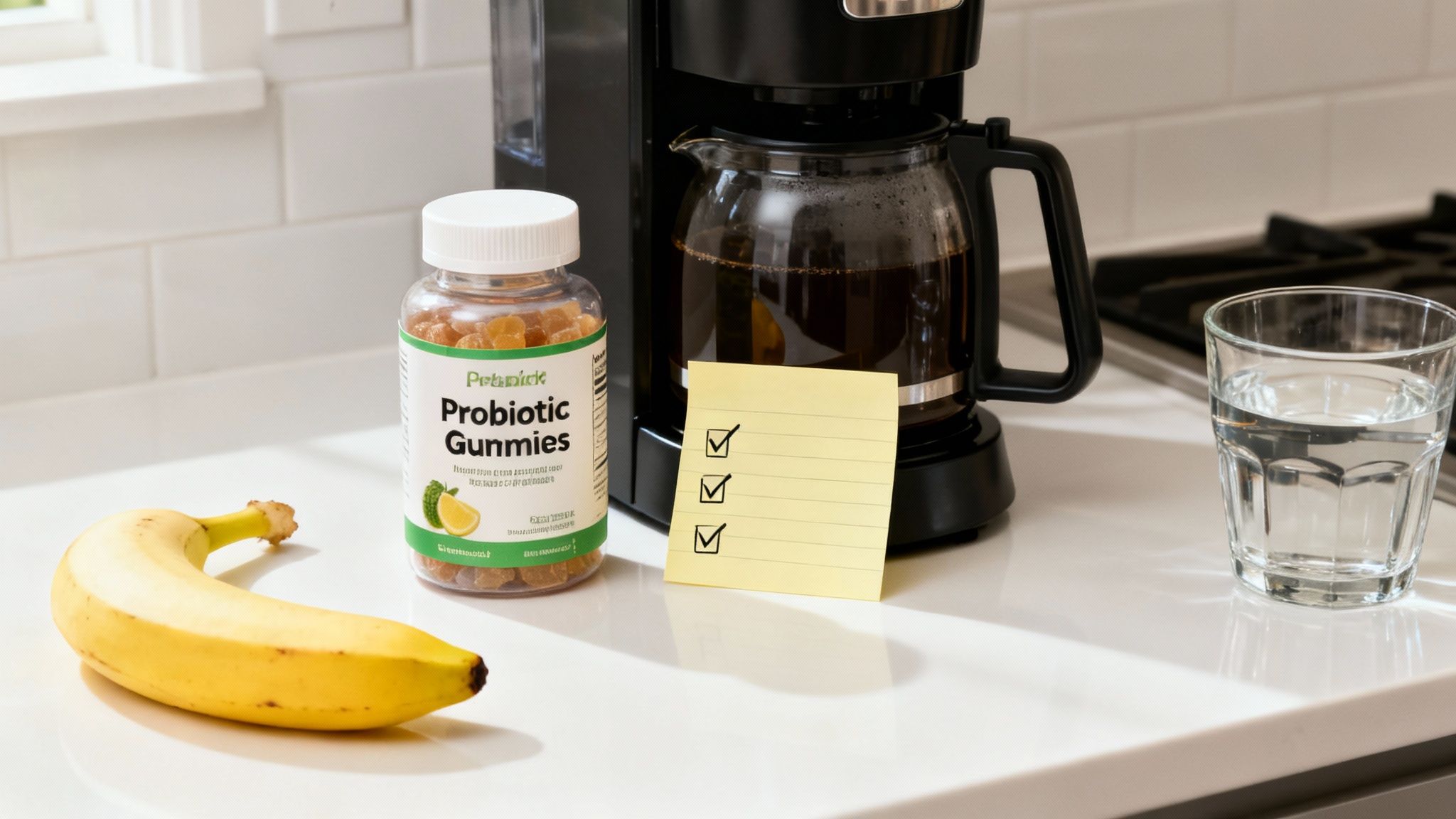The Best Time to Take a Probiotic for a Happy Gut
Ever feel like your stomach inflates like a balloon by the afternoon? You’re not alone-and it’s not always just what you ate. The real secret to beating the bloat might not be what probiotic you’re taking, but when you’re taking it.
It turns out, the best time to take a probiotic is consistently 20 to 30 minutes before a meal. This simple strategy gives those good bacteria the head start they need to survive your stomach acid and actually get to work. Let’s break down why this little timing tweak is a total game-changer for your digestion.
The Simple Timing Secret for Better Gut Health
It's a common story, and a frustrating one. You've started taking a probiotic, hoping for some relief from bloating and digestive drama, but you're not seeing the results you expected. If that sounds familiar, we get it, and you're definitely not alone.
The truth is, even the highest-quality probiotics need a little help to get their job done. Think of your probiotic supplement as a team of tiny helpers trying to navigate a treacherous path to your intestines. Their biggest hurdle? The intensely acidic environment of your stomach.
Why Timing Is Everything
Tossing your probiotic into a completely empty stomach is a rough ride for these beneficial bacteria. However, taking it just before you eat provides a much-needed protective buffer. The food you're about to consume helps temporarily lower your stomach's acidity, paving a safer path for more of those good guys to arrive alive and ready to get to work.
This small adjustment can be a total game-changer. The chart below gives you a clear picture of how much timing can influence your probiotic's survival rate.

As you can see, giving your probiotic a head start before a meal significantly boosts its odds of success compared to taking it on an empty stomach.
The Science Corner: What This Means for You
This isn't just a guess; it's grounded in solid science. A study published in the journal Beneficial Microbes found that probiotic survival was significantly higher when taken 30 minutes before a meal compared to 30 minutes after.
What this means for you: Taking your probiotic just before eating raises the stomach's pH level (making it less acidic), creating a much friendlier environment for your supplement. This ensures more bacteria make it to your gut alive, which means better results for you.
To help you visualize, here’s a quick breakdown of what happens when you take your probiotic at various times.
Quick Guide: Probiotic Timing Scenarios
| Timing | Stomach Acidity | Probiotic Survival Rate | Recommendation |
|---|---|---|---|
| With a Meal | Low | High | A good option if you forget to take it beforehand. |
| 30 Mins Before a Meal | Low | Very High | The ideal window for maximum effectiveness. |
| On an Empty Stomach | High | Low | Not recommended; acid can destroy beneficial bacteria. |
Ultimately, timing your probiotic to arrive just before your food creates the perfect conditions for it to thrive.
Of course, timing is just one piece of the puzzle. A truly healthy gut also depends on what you eat. To give your probiotics the best possible support, consider incorporating some high-fiber meal prep ideas for gut health into your weekly routine.
And don't forget about prebiotics! They are the fuel that feeds your good bacteria. To learn more about creating the ultimate gut-friendly team, check out our guide to natural probiotics and prebiotics.
Why Probiotic Timing Is So Important
Think of your probiotic supplement as a team of tiny, beneficial microbes on a mission. Their destination? Your intestines. But to get there, they have to survive a perilous journey through the stomach, which is basically a vat of powerful acid designed to obliterate bacteria.
This is where timing isn't just a small detail-it's everything.
If you pop your probiotic on a completely empty stomach, those helpful microbes face the full, undiluted force of that acid. It's a harsh environment, and frankly, most of them won't survive the trip. This is a huge reason why some people feel their probiotics aren't working. The truth is, they never got a chance to.

Creating a Safer Passage
So, how do we give our good bacteria a fighting chance? The key is to take your probiotic about 20 to 30 minutes before you eat. This simple tweak to your routine can make all the difference.
When you eat, your stomach gets ready to digest, and the food itself acts like a protective buffer. It temporarily lowers the stomach's acidity (raising its pH), creating a much friendlier environment for those delicate microbes. It's like sending in a protective escort ahead of your reinforcements.
By taking your probiotic just before a meal, you’re creating a safer passage. This ensures that a much higher number of beneficial bacteria survive the stomach and arrive in your intestines alive and ready to get to work.
This isn’t just a clever hack; it's about syncing up with your body’s natural processes to get the best results.
The Survival Advantage
Why does this matter so much? Because more survivors mean more power.
When a larger army of probiotic bacteria reaches your gut, they can colonize and start their work much more effectively. They can help balance your microbiome, support digestion, and ease discomfort like bloating. It’s the difference between a few lone soldiers showing up and a full, thriving colony ready for action.
Understanding this simple principle unlocks the real power of your supplement. It’s not about finding a "stronger" formula or spending more money. It’s about making one small, consistent change that ensures you get the maximum benefit from every single dose. That's how you start to feel the real difference.
Choosing Your Probiotic Routine: Morning or Night?
When it comes to supplements, the "morning vs. night" debate is a classic. We get it-you want to get the most out of your investment in your health, and timing feels like a crucial piece of that puzzle. But the truth is, the perfect schedule is simpler than you might think.
Let's walk through both options so you can find the routine that truly fits your life.

The Case for a Morning Probiotic
Starting your day with a probiotic can be a great way to prime your digestive system for everything that follows. For most people, it’s just easier to remember when you stack it with other established habits, like brushing your teeth or brewing that first cup of coffee.
- Pros: Simple to remember and sets your gut up for the day's meals.
- How to do it: Just take your probiotic with a glass of water about 20 minutes before you eat breakfast.
The Case for a Nighttime Probiotic
Taking your probiotic in the evening has its own set of advantages. Your digestive system naturally slows down while you sleep, creating a less chaotic environment. This quiet period can give those beneficial bacteria a better chance to settle in and colonize your gut without being rushed through.
- Pros: Slower gut motility at night may help the bacteria thrive and establish themselves.
- How to do it: Try taking your probiotic roughly 20 minutes before dinner or with a small, healthy bedtime snack.
The Most Important Factor: Consistency
So, what’s the final verdict-morning or night? Here’s the big secret: consistency is far more important than the specific time of day. A probiotic you take faithfully every single day will always outperform one that you only remember now and then.
The real goal is to build a habit that sticks. The best routine is simply the one you can commit to, as long as you're taking it with a meal to help buffer stomach acid. This isn't just a hunch; it's a principle recognized globally. In the Asia Pacific region, for example-a massive USD 33.29 billion market in 2024-product instructions consistently recommend taking probiotics just before or during meals to work with the body’s natural digestive rhythm. You can read more about these global probiotic trends and see how timing is emphasized worldwide.
The ultimate best time to take a probiotic is the time you won't forget. Pick a meal-breakfast, lunch, or dinner-and stick with it. Your gut will thank you for the reliability.
Finding Your Probiotic Sweet Spot
There's no one-size-fits-all answer when it comes to gut health. Your body is unique, and what sends your friend's gut singing might not be the perfect tune for you. That's totally normal. Figuring out the best time to take a probiotic is really about tuning in to your own system and finding a rhythm that works for you.
Let's explore a few common situations and map out a game plan to get you started.
Taking Probiotics with Antibiotics
Antibiotics are lifesavers when it comes to knocking out nasty bacterial infections. The problem is, they don't really distinguish between the bad guys and the good guys in your gut-it's more of a scorched-earth approach. Dun, dun, dun-unwelcome gas and diarrhea. Yikes! This is why taking a probiotic during a course of antibiotics is such a good idea, but you have to be smart about the timing.
The golden rule here is to space your probiotic and antibiotic doses at least two hours apart. If you take them too close together, the antibiotic can simply cancel out the benefits by destroying the very bacteria you're trying to add.
Think of it as giving the probiotics a head start. That two-hour buffer is all they need to get to where they need to go and start setting up shop.
For Those with a Sensitive Stomach
If your stomach is easily upset, the thought of introducing something new can be a little daunting. The last thing you want is for your well-intentioned supplement to stir up more gas or bloating. I get it completely.
The trick is to ease into it gently.
- Start low and go slow: Try taking half the recommended dose for the first week. This gives your digestive system a chance to get acquainted without feeling overwhelmed.
- A little food can help: While the ideal is often taking probiotics about 20 minutes before you eat, taking them with a small, light meal can act as a buffer and minimize any potential discomfort.
- Look for a clean formula: Make sure your probiotic is free of unnecessary fillers, allergens, or artificial junk that could irritate a sensitive system.
For Vegans and Plant-Based Eaters
Living a vegan lifestyle means you're already paying close attention to labels. Unfortunately, a surprising number of supplements use dairy as a fermentation medium or package their probiotics in gelatin capsules. I do NOT think that’s okay.
This is the very reason we developed Yuve Vegan Probiotic Gummies. We were committed to creating a potent, effective formula that everyone could feel good about taking. Our gummies are 100% dairy-free, gelatin-free, and use fruit-based pectin instead. It’s a simple way to get the gut support you need without having to compromise on your principles.
How Better Timing Solved Our Own Gut Issues
All the scientific advice in the world is great, but sometimes you just want to hear from someone who's been there. I get it. That's why I want to share a bit of our founder's story, because for years, he was stuck in a frustrating cycle of digestive problems.
He felt like he was doing everything by the book-eating clean, staying active, taking all the right supplements-but the constant bloating and gut unease just wouldn't let up. He swapped probiotic brands and tried different formulas, but nothing gave real, lasting relief. Honestly, it was starting to feel like a happy gut just wasn’t in the cards.
The 'Aha' Moment
The big breakthrough didn't come from a new supplement or a crazy diet. It was something much simpler: timing. He discovered that when you take a probiotic can be just as crucial as what probiotic you take.
So, he decided to run a little experiment. He started taking a probiotic with a glass of water every single morning, about 20 minutes before digging into his breakfast smoothie. That was the only thing he changed.
The results were incredible. Within just a couple of weeks, the daily bloating started to disappear. For the first time in a long time, he felt that consistent digestive comfort he’d been chasing. It was a true 'aha' moment-the secret wasn't just in the supplement itself, but in syncing it with his body's natural rhythm.
This personal journey is the heart and soul behind Yuve Vegan Probiotic Gummies. We wanted to create something that wasn't just effective and made with clean, plant-based ingredients, but was also delicious and simple to fit into that critical pre-meal routine.
Popping two tasty gummies before the morning meal was the final piece of the puzzle that unlocked the gut harmony he’d been missing. For us, it’s not just another product; it’s the answer that finally solved our own gut health riddle.
Your Quick Wins for Probiotic Success
Alright, let's put all this science into practice. Forget the guesswork-this is about making your probiotics work smarter, not harder. Here’s a simple plan to help you get the absolute most out of every dose and start building a healthier, happier gut.
Nail Your Timing and Routine
Building a solid habit is the key to seeing real, lasting results. This isn't about perfection; it's about consistency. Here are a few practical steps to make your probiotic routine feel second nature.
-
Take It Before You Eat: The sweet spot is about 20-30 minutes before a meal. This gives the good bacteria a head start, letting them pass through your stomach before peak acid production kicks in. It’s a small change that makes a huge difference in their survival rate.
-
Anchor It to a Meal: Piggyback your probiotic habit onto something you already do every day. Tying it to breakfast is a popular choice. A great trick? Keep your Yuve Vegan Probiotic Gummies right next to your coffee machine or oatmeal container. If you see it, you'll remember it.
-
Don't Forget Their Food: Probiotics are living organisms, and they need fuel to flourish. Make sure you’re eating prebiotic-rich foods-think of it as fertilizer for your gut garden. Adding a banana to your smoothie, a side of asparagus with dinner, or starting your day with oatmeal are all fantastic and easy ways to do this.
-
Keep Them Cool: Heat is the enemy of live probiotic cultures. Always check the storage instructions on the bottle. Some need refrigeration, while others are fine in a cool, dark pantry. You can learn how to read supplement labels to find this and other crucial info.
-
Hydrate, Hydrate, Hydrate: Always take your probiotic with a glass of cool or room-temperature water. This helps it travel smoothly through your system. Just be sure to avoid hot drinks like coffee or tea right when you take it, as high temperatures can kill off the delicate bacteria before they even get a chance to work.
Your Daily Probiotic Checklist
| Action Step | Why It Helps | Yuve Tip |
|---|---|---|
| Set a Daily Alarm | Creates an unmissable reminder, especially for the first few weeks. | Label your alarm "Gut Health Time!" to reinforce the positive habit. |
| Choose Your Anchor Meal | Links your new habit to an existing one (like breakfast), making it automatic. | If mornings are chaotic, link it to your lunch or dinner routine instead. Consistency is what matters most. |
| Prep Your Prebiotics | Ensures your probiotics have the fuel they need to colonize and thrive. | Add flax seeds or a handful of berries to your breakfast bowl-both are prebiotic powerhouses that pair perfectly with our gummies. |
| Check Your Supply | Prevents you from running out and breaking your streak. | When you open a new bottle of Yuve gummies, immediately set a calendar reminder to reorder in three weeks. |
By turning these small actions into a daily ritual, you're not just taking a supplement-you're actively investing in your long-term digestive wellness.
FAQ: Common Questions About Probiotic Timing
We’ve covered a lot of ground, but you might still have a few questions swirling around. That’s perfectly normal! Getting the details right on when to take your probiotic can feel like a big deal, so let’s clear up some of the most common questions we hear.

Can I take my probiotic with hot coffee or tea?
It’s so tempting to wash down your morning supplement with that first warm sip of the day, but please don't! Heat is the enemy of probiotics. High temperatures can easily kill the delicate live bacteria, rendering your supplement completely ineffective. It's like sending your tiny gut allies into a volcano. For best results, stick with cool or room-temperature water and wait at least 20 to 30 minutes before you enjoy that hot coffee or tea.
What if I forget to take my probiotic before a meal?
Life happens, and routines get disrupted. If you forget your usual pre-meal dose, don’t just skip it for the day. The next best thing is to take your probiotic with your meal. The food still provides a helpful buffer against harsh stomach acid, giving the bacteria a much better chance of survival than they’d have on a totally empty stomach later. Remember, consistency is always better than perfection.
How long until I notice a difference?
This is the big one, isn't it? The honest answer is that every gut is unique. Some people report feeling a positive shift in things like bloating and digestion within just a few days. For many others, it takes about two to four weeks of consistent daily use for the beneficial bacteria to really colonize, flourish, and start making a noticeable impact. For a deeper dive into what to expect, check out our guide on how long probiotics take to work.
Do I also need to take a prebiotic?
While it’s not strictly required, pairing your probiotic with a prebiotic is a brilliant strategy for maximizing your gut health. Here’s a simple way to think about it: probiotics are the seeds, and prebiotics are the fertilizer. Prebiotics are specific types of fiber that feed your good bacteria, helping them multiply and thrive. You can get prebiotics from foods like bananas, oats, and garlic. To make things even simpler, we include a prebiotic blend right in our Yuve Vegan Probiotic Gummies to make sure those good guys have all the fuel they need to get the job done.
Ready to build a simple, effective routine for a happier gut? Yuve is here to support you every step of the way. Try our delicious, plant-based Vegan Probiotic Gummies and feel the difference that a well-timed, well-fueled probiotic can make. We'd love to hear about your gut-health journey in the comments below
